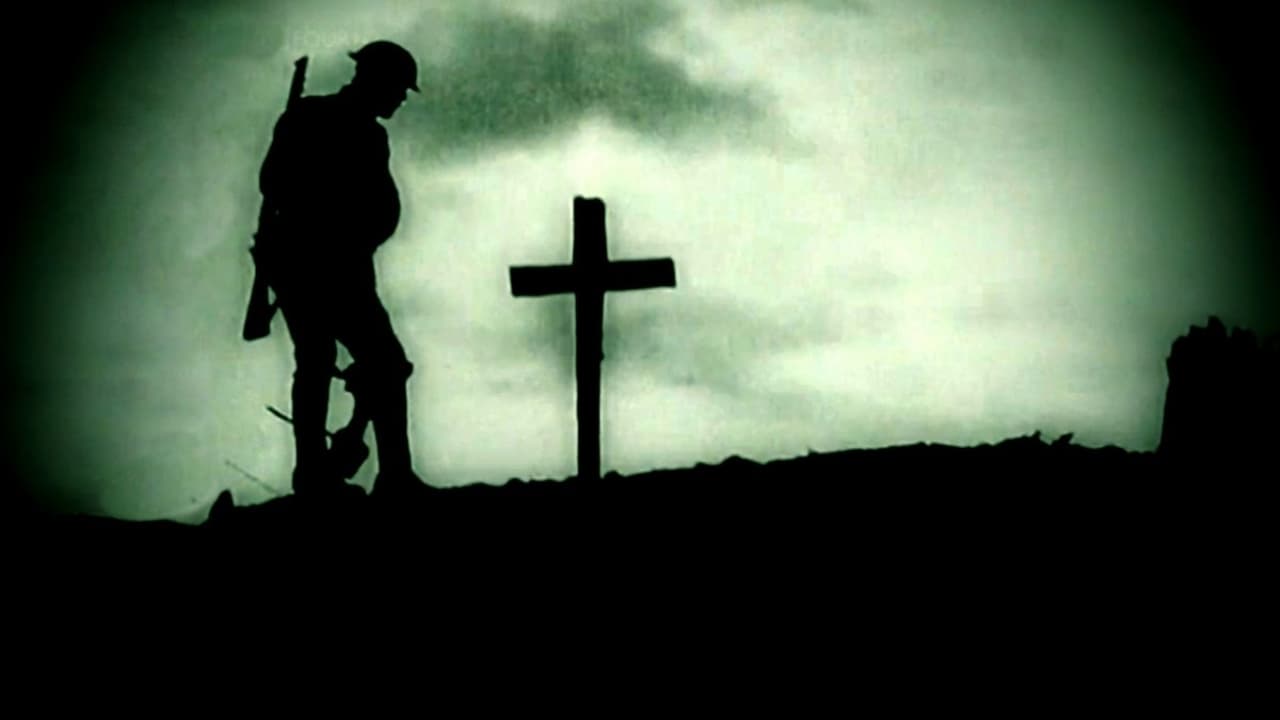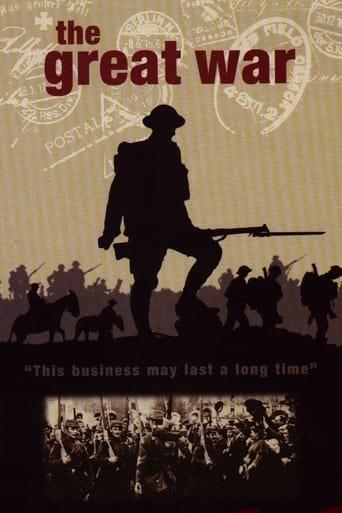Exoticalot
People are voting emotionally.
Glucedee
It's hard to see any effort in the film. There's no comedy to speak of, no real drama and, worst of all.
TrueHello
Fun premise, good actors, bad writing. This film seemed to have potential at the beginning but it quickly devolves into a trite action film. Ultimately it's very boring.
Fairaher
The film makes a home in your brain and the only cure is to see it again.
Robert J. Maxwell
This superior series continues in Episode Number Two. The first episode limned in the general nature of the geopolitical framework. Mainly we see happy aristocrats having a ball, poverty everywhere, and tribal allegiances strengthening.This episode leads the viewer to the declarations themselves, the result of bungling, national pride, religious conflicts, and a general absence of any sense of what would follow. Crowds cheer in Berlin, Paris, and London. They wave flags. They don't seem to realize that every war begins with the feeling that it will be over in a short time, like a high school soccer game.The act of one crazed nationalist in Sarajevo had just precipitated a conflict that would last four bloody years and result in more than 37 million civilian and military casualties.It's all tragic and judging from recent iterations, unavoidable. The questions that it raises -- in me anyway -- don't have as much to do with cultural influences as they do with biology. Is there something in human nature that NEEDS to kill? The question practically asks itself.
Mark Rizo (baltopro)
I just finished watching the series again, for at least the fifth time. "The Great War" is one of the best historical documentaries ever made - on-par with Ken Burns' "The Civil War" - and is the definitive program on the subject matter.Rather than rehash all that's already been said, I would like to make a couple of (hopefully) fresh observations.This series' soundtrack is an audio masterwork. Aside from occasional interviews, photos, and graphics cutaways, "The Great War" is necessarily comprised primarily of SILENT film footage. The sound added is done so well, it took me some time to remember this.It is a tour de force of "foley" - sound effects added after the fact. Scenes of men in camp, on the march, and in battle - shots that would otherwise be silent - are meticulously enhanced with believable ambient sounds: footsteps falling, metal clanging, wind blowing, horses snorting, flies buzzing, men shouting, etc.Add to this the haunting score by the BBC Northern Orchestra, Michael Redgrave's mesmerizing narration, character voiceovers by a talented cast, plus the voices of actual veterans. Sound and visual mesh seamlessly and with perfect pacing.The series does have one glaring weak spot: Very little discourse on the weapons and technology of the war.The use of poison gas is detailed, there is mention of flame throwers, and the viewer is told there were varying sizes of artillery. Submarines and surface warships are given a cursory review. That's about it. For the most part, no information is provided about weapons development or capability - virtually nothing on aircraft, tanks, machine guns, or small arms.For example, unless learned outside the series, a viewer could assume that semi-automatic assault rifles were standard issue in WWI. It's amazing that, in over 17 hours of content, you never hear the terms "Enfield rifle", "Mauser rifle", or even "bolt-action".Almost nothing is said about the medical technology of the era, or the huge advances made in treatment, like blood transfusions becoming practical. Little is said about disease. The "Spanish Flu" of 1918 was the worst pandemic in human history, resulting in some 50 million deaths, including more than half of all US servicemen who died in the war, but it is never mentioned.I guess I'm kind of a tech guy. To its credit, The Great War does avoid falling into a pit of techno-babble that might bore the casual viewer. The program consistently stays on-point: the mindset of the era, how and why historical events took their course, and how the war impacted the common soldier and citizen.Though the series finale spends much time on the Allied celebration of the armistice, it does not mention the Treaty of Versailles, the League of Nations, or any of the shortcomings made in concluding WWI (key factors in having to fight the war all over again in 21 years, on an even greater scale). I suppose this would have been anti-climatic, but they could have thrown-in at least a sentence or two about the war's legacy. On the other hand, maybe it's just as well - there's a bazillion documentaries on WWII that start where "The Great War" leaves off. WWI was a watershed event in human history that deserves due consideration outside of WWII's shadow, and "The Great War" drives this point home.That being said, a true understanding of the Second World War is not possible without an in-depth understanding of the First World War, and "The Great War" is the best source for this that I know of. Bottom line: "The Great War" is a highly engaging and relevant program, even 50 years after its first showing, and 100 years after the start of WWI. It's a must-see for anyone interested in 20th century and/or military history, and should be required viewing for everyone.
breezer030
Most comments on the BBC documentary series The Great War tend to praise its detailed and impressively sombre style. True, this documentary gives details on all the different years, fronts and countries that were involved in Word War I. And true, even though it takes a staggering 26 episodes of 40 minutes each (totaling over 1,000 minutes!), it stays fascinating material and wonderfully narrated.What I find problematic is that the whole focus is on facts, tending to let analysis and insights get nearly lost. It only briefly discusses the origins of the war. These go way back to the 19th century with the Crimea War, the Concert of Europe, the Franco-Prussian War, the Scramble for Africa and the competitive nature of the great powers. Although some of these elements are briefly mentioned in one of the first episodes, it only scratches the surface. I tend to find reasons WHY things happen more interesting than WHAT happens. If you would make a documentary of the Hundred Years War (14th-15th century), I guess most would focus on the causes, most important facts and the consequences of that war, and not only on every battle. I guess that the production date of this documentary (1960s) can explain the strong focus on facts; in the first decades after highly-emotional wars the focus of history writing tends to be on facts. Insight comes with time and rational distance from the war.Given the focus on the facts, I was stunned about two major omissions in the documentary. First, there was no mention of the Spanish flu. This could hardly be considered a trivial matter, since it killed more people than World War I and was raging in the trenches from March 1918 on. Maybe the impact of the Spanish flu on the war was not fully understood at the date of production of this documentary. Second, the last episodes ends at the armistice, 11 November 1918. There is no mention of the peace talks and the peace of Versailles. The Great War officially ended after the peace agreement and not at the armistice. And no mention of the aftermath and consequences of World War I.So my conclusion is that it is an impressive documentary to watch, but it could have been even better.
rjhargreaves
Quite simply the definitive documentary on the First World War. 26 40-minute episodes which do as much as any book to encapsulate the 1914-1918 conflict. I'd go so far as to say it surpasses the World at War (which basically copied it!) as THE television documentary. The narration is perfectly pitched, the soundtrack is stunning, and there were enough veterans from all sides to add personal insights into the war. But what I think lifts it above all other Great War programmes (apart from the length) is that it gives airtime to campaigns that simply don't get a look in normally - the Eastern Front and Palestine; there are even lengthy segments on the war at sea with some excellent archive footage. If you've got a day to spare, watch it all in one go: you'll be better for it...

